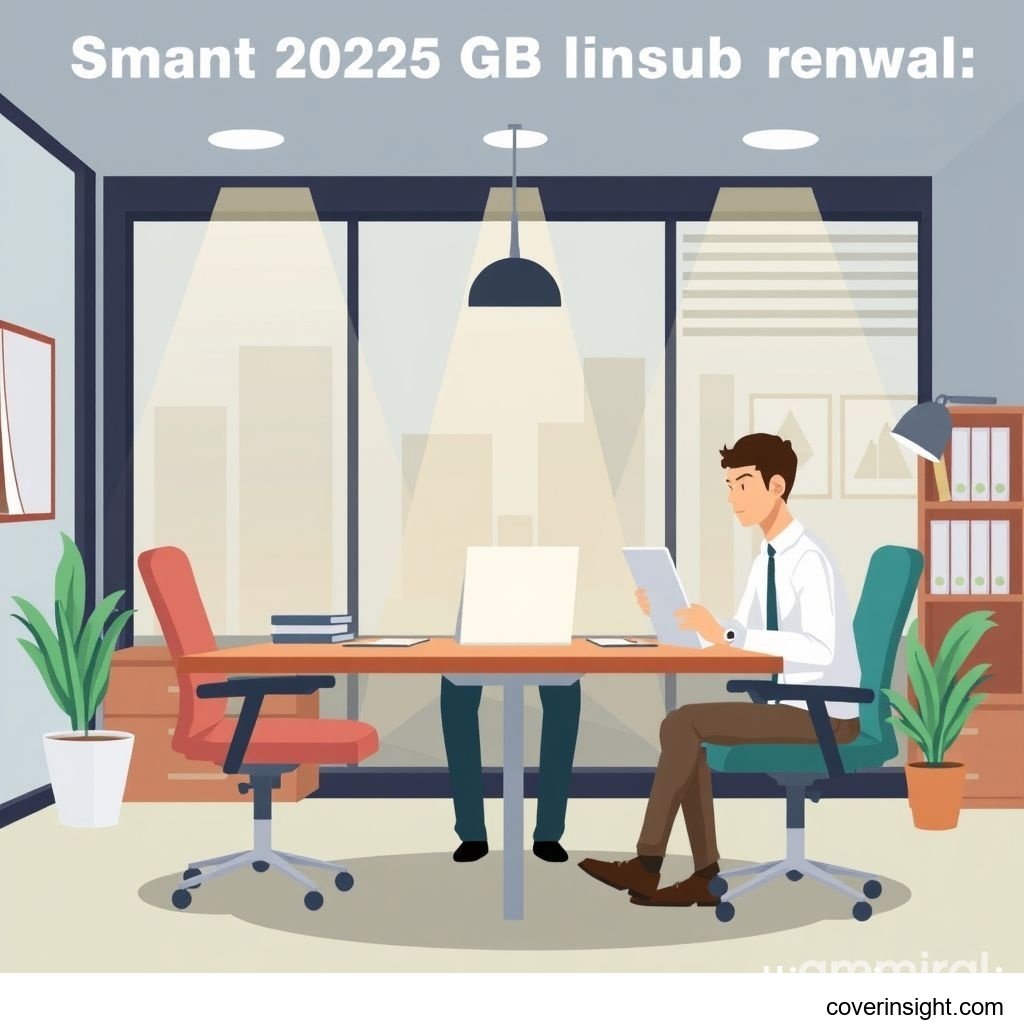Introduction
As GB navigates the evolving economic landscape of 2025, understanding and optimising essential services becomes paramount for households and businesses alike. One such critical service is insurance, and admiral stands as a key player in the UK market, renowned for its diverse offerings from car and home to travel and pet insurance. For consumers, the strategic renewal of policies is not just about convenience; it's a vital exercise in financial prudence and risk management. With seasonal shifts influencing various aspects of life, from travel plans to property maintenance, adopting a smart approach to seasonal insurance preparation ensures comprehensive protection without unnecessary expenditure. This guide delves into the secrets of smart policy renewal, empowering you to make informed decisions that align with your dynamic needs throughout the year. The focus is on leveraging admiral’s extensive suite of products to secure optimal coverage, particularly when considering long-term financial stability and goals such as retirement planning insurance.
Coverage Details
Securing the right insurance coverage is fundamental to safeguarding your assets and financial well-being. Policies from admiral are designed to offer robust protection against a myriad of risks, yet it's crucial to understand the specifics of what each policy entails. Knowing your coverage details helps prevent unexpected financial burdens.
What’s Included
While specifics vary significantly by policy type (e.g., home, car, travel), general inclusions often feature:
-
Damage Protection: Coverage for repair or replacement costs due to accidents, natural disasters (like floods or storms), or fire.
-
Theft Protection: Reimbursement for losses incurred from stolen items or vehicles.
-
Liability Coverage: Protection against claims made by third parties for injury or property damage caused by you or your insured property.
-
Breakdown Assistance: Often an optional add-on for vehicle policies, providing roadside recovery services.
-
Medical Expenses: For travel insurance, this covers emergency medical treatment overseas.
-
Alternative Accommodation: If your home becomes uninhabitable due to an insured event, this covers temporary living expenses.
Common Exclusions
Understanding what your policy doesn't cover is just as important as knowing what it does. Common exclusions across various admiral policies can include:
-
Wear and Tear: Gradual deterioration of property or items over time is typically not covered.
-
Deliberate Damage: Any damage caused intentionally by the policyholder.
-
Unattended Property: Losses incurred when insured items are left unsecured or unsupervised (e.g., leaving a car unlocked).
-
Acts of War or Terrorism: These are standard exclusions in many insurance policies.
-
Pre-existing Conditions: For health or travel insurance, undisclosed medical conditions often void claims related to those conditions.
-
Unauthorised Use: If a vehicle is driven by someone not listed on the policy, or without a valid licence.
Cost Analysis
The cost of insurance premiums can fluctuate based on numerous variables. Understanding these factors and implementing strategic saving tips are key aspects of smart seasonal insurance preparation. Admiral strives to offer competitive rates, but informed consumers can always find ways to optimise their expenditure.
Price Factors
Several elements influence the price of your admiral policy, reflecting the assessed risk:
-
Claim History: A history of previous claims typically leads to higher premiums, as it indicates a higher likelihood of future claims.
-
Location: Postcode can significantly affect home and car insurance costs due to varying crime rates, flood risks, or traffic density.
-
Value of Insured Item: More expensive cars, larger homes, or high-value personal belongings naturally require higher coverage and thus cost more.
-
Security Measures: Enhanced security features, such as alarms, immobilisers, or secure locking systems, can reduce premiums.
-
Policy Excess: Choosing a higher voluntary excess (the amount you pay towards a claim) can lower your premium.
-
Age and Experience: For car insurance, younger or less experienced drivers often face higher premiums.
Saving Tips
Reducing your insurance costs without compromising essential coverage is achievable with these smart strategies:
-
Shop Around Annually: Don't automatically renew. Compare quotes from different providers, even if you like admiral. While loyalty discounts exist, new customer offers can be significant.
-
Increase Voluntary Excess: If you can afford to pay more upfront in the event of a claim, a higher excess can substantially lower your premium.
-
Improve Security: Install approved alarms, immobilisers, or tracking devices for vehicles, or better locks and security systems for homes. This reduces risk in the eyes of insurers.
-
Bundle Policies: Many insurers, including admiral, offer discounts when you purchase multiple policies (e.g., home and car) from them.
-
Review Your Coverage: Annually assess if your current coverage still meets your needs. You might be over-insured on certain items or risks you no longer face.
-
Maintain a Good Credit Score: Some insurers use credit information as a factor in pricing.
-
Consider Telematics/Black Box Insurance: For younger or less experienced drivers, a telematics policy can offer lower premiums based on safe driving habits.
Seasonal Policy Optimization
The concept of smart seasonal insurance preparation is gaining traction, especially as climatic events become more unpredictable and lifestyle changes occur throughout the year. Adapting your admiral policy to these shifts can ensure you're always adequately covered, avoiding both gaps in protection and unnecessary expenses.
Adapting for Seasonal Needs
Your insurance requirements aren't static; they evolve with the seasons and your activities. For instance:
-
Summer Travel: Before planning a summer holiday, review your travel insurance. Does it cover all destinations, activities (e.g., winter sports, adventure tourism), and the value of your luggage? For homeowners, ensure your home insurance is valid if your property is unoccupied for extended periods.
-
Winter Weather: As colder months approach, consider enhanced home insurance for potential pipe bursts or storm damage. If you have a classic car or motorcycle that's stored away for winter, you might be able to switch to a laid-up policy to reduce costs.
-
Festive Season: During peak gifting periods, reassess your contents insurance to ensure high-value items (new electronics, jewellery) are adequately covered. Many policies have limits for single items.
-
Garden Equipment: As seasons change, so does the use of garden equipment. Ensure your shed and its contents (mowers, tools) are protected, especially if they are valuable.
By proactively reviewing your policy ahead of these seasonal changes, you ensure continuity of appropriate coverage.
Strategic Renewal Insights
Effective seasonal insurance preparation isn't just about reacting to immediate needs; it involves a forward-thinking approach to your policy renewals.
-
Calendar Reminders: Set reminders a month or two before your renewal date. This provides ample time to research, compare quotes, and discuss options with admiral.
-
Lifestyle Changes: Any significant lifestyle changes – marriage, new job, moving house, a new car, or starting a family – should prompt a review of your insurance needs immediately, not just at renewal. These often have seasonal implications, such as increased travel or new property risks.
-
Usage Patterns: For vehicle insurance, consider if your mileage has changed significantly. If you're now working from home more, your car usage might have dropped, potentially qualifying you for lower premiums.
-
No-Claims Discount (NCD): Understand how your NCD builds up and how a claim might affect it. Protecting your NCD can be a smart long-term strategy for saving money.
-
Policy Adjustments: Don't hesitate to contact admiral to adjust your policy mid-term if your circumstances change. While there might be small admin fees, it's better than being underinsured or paying for coverage you no longer need.
Long-Term Financial Planning with admiral
Insurance is more than just a safety net for immediate risks; it's a foundational component of robust long-term financial planning. This is particularly true when considering significant life stages like retirement, where retirement planning insurance becomes a critical consideration.
Integrating Insurance into Retirement Planning
As individuals approach and enter retirement, their insurance needs often shift. proactive planning with admiral can ensure a seamless transition:
-
Property Downsizing: If you plan to downsize your home in retirement, your home insurance needs will change, likely decreasing.
-
Increased Travel: Many retirees travel more. Comprehensive travel insurance becomes essential, often requiring specialist policies for older travellers or those with pre-existing medical conditions.
-
Vehicle Usage: Your car usage might decrease, or you might switch to a smaller, more economical vehicle. Adjusting your car insurance accordingly can yield savings.
-
Reviewing Life Insurance: While some life insurance policies mature, it’s worth reviewing if your dependants still require the same level of cover, or if new policies focused on estate planning are more suitable.
-
Healthcare Considerations: While the NHS provides comprehensive care in GB, private medical insurance might become a consideration for some during retirement.
Thoughtful integration of insurance into your overall financial strategy ensures that your assets are protected throughout your retirement years, offering peace of mind.
Future-Proofing Your Coverage
Beyond immediate needs, smart consumers use admiral to future-proof their coverage, anticipating changes that will impact their retirement planning insurance and other policies:
-
Inflation Impact: Consider how inflation might affect the replacement cost of your home or contents over time. Regularly review your sum insured to avoid underinsurance.
-
Estate Planning: Work with financial advisors to align your insurance policies with your broader estate plans, ensuring that beneficiaries are correctly named and policies serve their intended purpose.
-
Longevity Planning: As people live longer, the need for long-term care insurance might arise. While not a primary admiral product, understanding its role within your overall financial picture is crucial.
-
Digital Assets: In an increasingly digital world, consider how your digital assets are protected. While not traditionally insured, their importance grows.
-
Policy Flexibility: Choose policies that offer flexibility to adapt to future changes, such as the ability to add or remove drivers, adjust coverage limits, or pause policies.
By thinking strategically about these long-term factors, you ensure that your insurance portfolio remains relevant and effective, safeguarding your financial future.
FAQs
Here are some frequently asked questions about admiral insurance in GB 2025:
How much does admiral cost?
The cost of admiral insurance varies widely based on the type of policy (car, home, travel, etc.), individual circumstances, risk factors, and chosen coverage limits. For example, a young driver with a new car will pay significantly more for car insurance than an experienced driver with a small, older vehicle. Similarly, home insurance premiums depend on property value, location, and security. It's essential to get a personalised quote for an accurate price.
What affects premiums?
Premiums are influenced by numerous factors, including:
-
Personal details: Age, occupation, claims history, driving experience (for car insurance).
-
Item details: Make, model, and age of vehicle; construction, value, and location of property.
-
Coverage choices: Level of cover, optional extras, chosen excess.
-
Security measures: Alarms, immobilisers, secure locks.
-
Usage: Annual mileage, purpose of use (e.g., commuting, business).
Is it mandatory?
In GB, motor insurance (third-party only at minimum) is legally mandatory for any vehicle used on public roads. Other types of insurance, like home or travel insurance, are not legally mandatory but are highly recommended for financial protection. Mortgage lenders, for instance, often require buildings insurance as a condition of the loan.
How to choose?
Choosing the right admiral policy involves:
-
Assessing your needs: What risks do you need to cover? What's the value of your assets?
-
Comparing quotes: Use comparison websites and direct quotes from admiral to find competitive prices.
-
Reading policy documents: Understand what's included and excluded.
-
Considering customer service: Look at reviews for claims handling and support.
-
Seeking advice: If unsure, consult with an independent insurance broker.
Consequences of no coverage?
The consequences of no coverage can be severe:
-
Legal penalties: Driving without insurance carries fines, penalty points, and potential disqualification.
-
Financial ruin: If you cause an accident or your property is damaged without insurance, you would be personally liable for all costs, potentially leading to bankruptcy.
-
Loss of assets: Your home or possessions could be lost or damaged without financial recourse.
-
Medical debt: Without travel insurance, medical emergencies abroad can incur exorbitant costs.
Conclusion
Navigating the complexities of insurance in GB for 2025, especially with a leading provider like admiral, demands a smart and proactive approach. By understanding the nuances of your coverage, diligently analysing costs, and embracing seasonal insurance preparation, you can unlock significant savings and ensure your assets are always adequately protected. Whether you're adapting to lifestyle changes, optimising for specific seasonal risks, or laying the groundwork for your future with retirement planning insurance, the principles of informed decision-making remain paramount. Regularly reviewing your admiral policies, leveraging strategic renewal insights, and aligning your insurance portfolio with your long-term financial goals are not just recommendations but essential practices for financial resilience. Take control of your insurance strategy now to secure a more predictable and protected future. For more comprehensive insights, explore Insurance Resources Global. Remember, a little preparation goes a long way in safeguarding your financial well-being. For specific GB-focused information, visit GB Insurance Home and always refer to authoritative sources like the Financial Conduct Authority and the Association of British Insurers for regulatory guidance and industry standards.








Comments